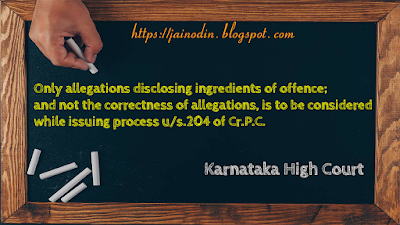What has to be considered at the time of issuing process u/s.204 of Cr.P.C.
- Allegations disclosing ingredients of offence? or
- the correctness of allegations? or
- sufficiency of material for conviction?
Tn the light of the above factual and legal position, the impugned order cannot be faulted with. As the allegations made in the complaints prima facie make out the ingredients of the offence under section 409 of IPC and there being clear allegations of conspiracy which are duly supported by the documents marked during the sworn statement of the complainant, the learned Special Judge was justified in issuing summons to the petitioners namely accused Nos.1 to 4 to answer the above charges. At the stage of issuing summons, learned Special Judge is not required to satisfy herself as to the correctness or otherwise of the allegations made against the petitioners nor is she required to record a finding that the material produced by the complainant is sufficient to secure a conviction against the proposed accused.[Para No.23]
What is Cognizance:
"What is taking cognizance has not been defined in the Criminal Procedure Code and I have no desire to attempt to define it. It seems to me clear however that before it can be said that any Magistrate has taken cognizance of any offence under Section 190(1)(a) of the Criminal Procedure Code, he must not only have applied his mind to the contents of the petition but he must have done so for the purpose of proceeding in a particular way as indicated in the subsequent provisions of this Chapter- proceeding under Section 200 and thereafter sending it for inquiry and report under Section 202. When the Magistrate applies his mind not for the purpose of proceeding under the subsequent sections of this Chapter, but for taking action of some other kind e.g. ordering investigation under Section 156(3), or issuing a search warrant for the purpose of the investigation, he cannot be said to have taken cognizance of the offence. The Court further held that "as to when cognizance is taken of an offence will depend upon the facts and circumstances of each case and it is impossible to attempt to define what is meant by taking cognizance."
(Relied on R.R.Chari Vs. State of U.P., AIR 1951 SC 207)[Para No.35]
Karnataka High Court
M R Bhat
Vs.
India Awake For Transparency
Decided on 15/05/2020

